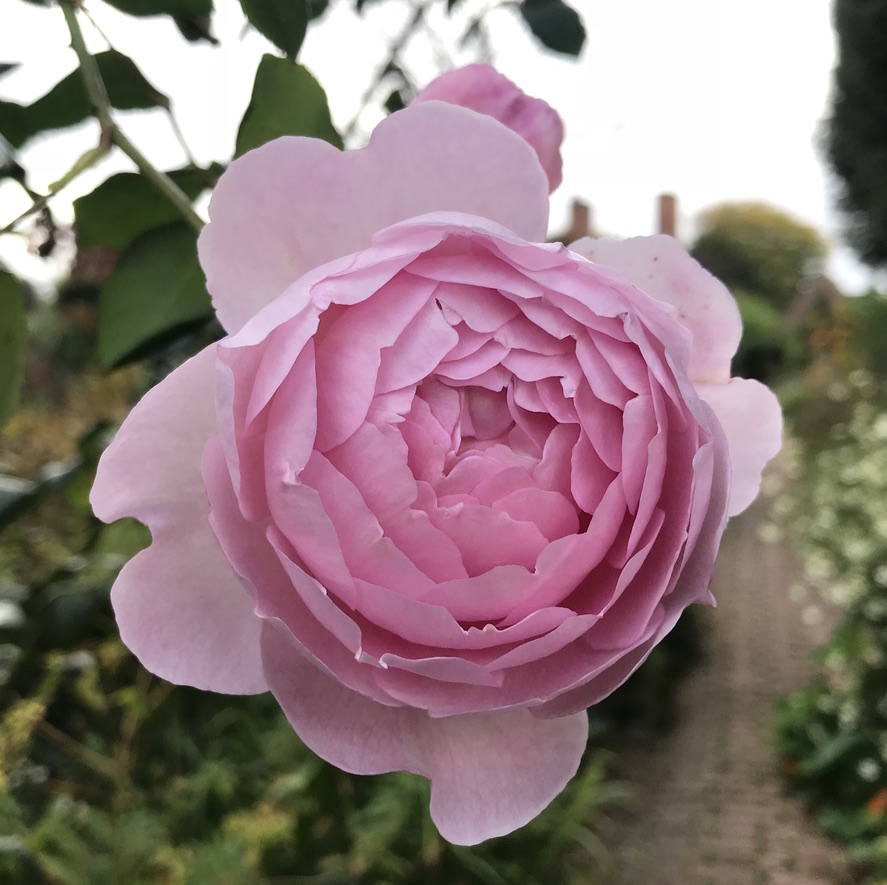As a garden designer, the most popular plants requested by clients – topping lavender, olive trees and lawns – are roses. They aren’t for everyone but they are for almost everyone if the number of requests is anything to go by. Roses are ingrained into the idea of the British garden, summers and perfumed bouquets.
I find roses curious, absolutely beautiful in romantic, cottage and formal gardens but I’m yet to find one, to my eye, that really suits a highly contemporary looking garden (I am trying!). This has made me increasingly interested in them and over the last two years I have planted into lots of gardens a good number of cultivars – shrub and climbers – and a few species roses such as R. canina and R. glauca.

As an organic gardener I look to plants that can thrive with minimal input from us and, while I certainly don’t force organic practices on my clients, I find most people would prefer this way of gardening, keen to learn how to make it work. I’m pleased to say most gardens I design end up being organic (I won’t personally do anything that isn’t organic). Here is the rub with roses then, they are famed for requiring buckets of chemicals thrown on them to stop pest and disease, including aphids and the unsightly fungal disease blackspot. Something I will not do.
To date I have found many of the cultivars live and flower well but do end up with blackspot. Aphids I’m not bothered about because I find the more you leave them, the more predators make home in the garden to deal with them. As a designer, I can’t be in every garden as much as I want and the care each garden receives varies – to remove infected leaves for instance – which is why it’s important to seek out the toughest plants, able to grow with minimal input. For some gardens they may only receive attention two to three times a year, though others can be once a month, which is better, or even twice a month.
My perception then has always been that roses are a problematic plant when in low-maintenance gardens – happy to live but becoming straggly. Without someone to check on them weekly to catch problems should I really be recommending them for other people’s gardens? Climbing roses are my favourites because they are so vigorous that they seem to require less attention – perhaps their raised up position also helps the wind to keep fungal problems at bay somewhat.
However, I know this view, that roses are pernickety, cannot be the case if so many people love and grow them. Keen to explore this topic further, I threw a shout out into the Twitterverse asking organic gardeners for advice, to share roses that appear to be the most resistant to disease like blackspot. It was caught by lots of people who threw much wisdom back at me:
- Monty Don: “It really depends what you mean by disease and resistant. Rugosas, albas, gallicas are famously tough, nearly all species roses even more so. But a good rule is that a healthy plant is the most ‘disease resistant’. Blackspot is very weather dependent – warm wet summers like this one increase it hugely. The only rose of mine that ALWAYS gets struck is ‘Souvenir de Malmaison’ which is a shame as it is lovely. But roses are tough – don’t mollycoddle them!”
- Jo Thompson: “Where do I start?… ‘Ghislaine de Feligonde'”
- Ellen Mary: “I’ve grown a fair few roses but ‘Korresia’ has always been amazing! It’s a beauty! Almost glows in the evening light, blooms on & on, never had any disease. Love it”
- Sara Venn: “Think it really depends on cultural work. I have no disease on mine, but I mulch every spring and never get water on the leaves. That said, species like gallica and canina are tough as old boots!!”
- Deborah Cavanagh: “I love the new ‘Gabriel Oak’ – they have flowered all summer since early spring, lush dark green leaves now and no disease in sight. A deep dark pink and stunning perfume.”
- Emma Mason: “‘Iceberg’ and ‘LD Braithwaite’ always do well for me. Don’t use anything on them, just lots of #peatfree mulch.”
- JoeWV: “Meidiland landscape roses are bulletproof. They just require really good pruners and gauntlets to prune them because they aggressively thorny.”
- Michelle Sleaford: “‘Bloom of Ruth'”
- Brook farm gardener: “‘Clare Austin’. Beautiful creamy white blooms, heavily scented and repeat flowers well into Autumn. Lovely healthy foliage.”
- Roving Nick: “The Albas”
- Conrad McCormick: “For Austin Roses, ‘James Galway’ (I grow it as a climber) and ‘Munsted Wood’ both are disease free. In my humid climate many English Roses are martyrs to blackspot. ‘For your eyes only’ has performed well and R. glauca is always on point, admittedly it’s quite a large shrub.”
- James G: “Tequila Gold. It was my only rose this past summer that was immune to black spot, Japanese beetles, and drought.”
- Anthony Noblet: “‘Lady of Shallot’ and ‘Generous Gardener’ they “outgrow” disease both ‘David Austin’ oh and ‘Olivia Rose Austin'”
- Julie Skelton: “Similarly, Gertrude Jekyll – hasn’t caused me any trouble, looks really healthy, smells wonderful and just keeps giving for a really long time.”
- Sophie Roberts: “‘Boscobel’. Bombproof and very floriferous. Smells good and cuts well too”



